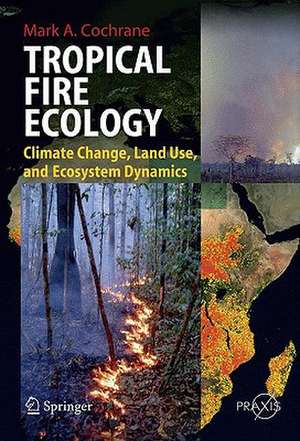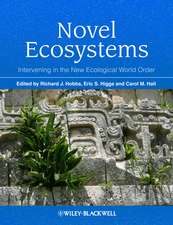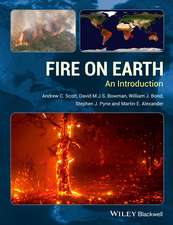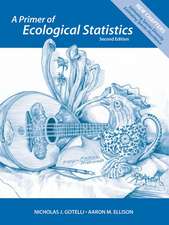Tropical Fire Ecology: Climate Change, Land Use and Ecosystem Dynamics: Springer Praxis Books
Autor Mark Cochraneen Limba Engleză Hardback – 2 apr 2009
The tropics are home to most of the world’s biodiversity and are currently the frontier for human settlement. Tropical ecosystems are being converted to agricultural and other land uses at unprecedented rates. Land conversion and maintenance almost always rely on fire and, because of this, fire is now more prevalent in the tropics than anywhere else on Earth. Despite pervasive fire, human settlement and threatened biodiversity, there is little comprehensive information available on fire and its effects in tropical ecosystems.
Tropical deforestation, especially in rainforests, has been widely documented for many years. Forests are cut down and allowed to dry before being burned to remove biomass and release nutrients to grow crops. However, fires do not always stop at the borders of cleared forests. Tremendously damaging fires are increasingly spreading into forests that were never evolutionarily prepared for wild fires. The largest fires on the planet in recent decades have occurred in tropical forests and burned millions of hectares in several countries.
The numerous ecosystems of the tropics have differing levels of fire resistance, resilience or dependence. At present, there is little appreciation of the seriousness of the wild fire situation in tropical rainforests but there is even less understanding of the role that fire plays in the ecology of many fire adapted tropical ecosystems, such as savannas, grasslands and other forest types.
Tropical deforestation, especially in rainforests, has been widely documented for many years. Forests are cut down and allowed to dry before being burned to remove biomass and release nutrients to grow crops. However, fires do not always stop at the borders of cleared forests. Tremendously damaging fires are increasingly spreading into forests that were never evolutionarily prepared for wild fires. The largest fires on the planet in recent decades have occurred in tropical forests and burned millions of hectares in several countries.
The numerous ecosystems of the tropics have differing levels of fire resistance, resilience or dependence. At present, there is little appreciation of the seriousness of the wild fire situation in tropical rainforests but there is even less understanding of the role that fire plays in the ecology of many fire adapted tropical ecosystems, such as savannas, grasslands and other forest types.
| Toate formatele și edițiile | Preț | Express |
|---|---|---|
| Paperback (1) | 2112.71 lei 6-8 săpt. | |
| Springer Berlin, Heidelberg – 21 oct 2010 | 2112.71 lei 6-8 săpt. | |
| Hardback (1) | 2127.22 lei 6-8 săpt. | |
| Springer Berlin, Heidelberg – 2 apr 2009 | 2127.22 lei 6-8 săpt. |
Din seria Springer Praxis Books
-
 Preț: 294.46 lei
Preț: 294.46 lei -
 Preț: 223.45 lei
Preț: 223.45 lei -
 Preț: 193.12 lei
Preț: 193.12 lei -
 Preț: 167.85 lei
Preț: 167.85 lei -
 Preț: 288.98 lei
Preț: 288.98 lei -
 Preț: 323.74 lei
Preț: 323.74 lei -
 Preț: 401.38 lei
Preț: 401.38 lei -
 Preț: 264.12 lei
Preț: 264.12 lei - 8%
 Preț: 513.00 lei
Preț: 513.00 lei -
 Preț: 190.01 lei
Preț: 190.01 lei -
 Preț: 218.16 lei
Preț: 218.16 lei -
 Preț: 312.06 lei
Preț: 312.06 lei - 17%
 Preț: 414.05 lei
Preț: 414.05 lei -
 Preț: 216.41 lei
Preț: 216.41 lei -
 Preț: 262.27 lei
Preț: 262.27 lei -
 Preț: 264.35 lei
Preț: 264.35 lei -
 Preț: 167.63 lei
Preț: 167.63 lei -
 Preț: 284.81 lei
Preț: 284.81 lei -
 Preț: 259.08 lei
Preț: 259.08 lei -
 Preț: 305.47 lei
Preț: 305.47 lei -
 Preț: 244.14 lei
Preț: 244.14 lei -
 Preț: 227.85 lei
Preț: 227.85 lei -
 Preț: 285.25 lei
Preț: 285.25 lei -
 Preț: 295.56 lei
Preț: 295.56 lei -
 Preț: 357.17 lei
Preț: 357.17 lei -
 Preț: 275.79 lei
Preț: 275.79 lei -
 Preț: 257.08 lei
Preț: 257.08 lei -
 Preț: 349.71 lei
Preț: 349.71 lei -
 Preț: 272.45 lei
Preț: 272.45 lei -
 Preț: 270.27 lei
Preț: 270.27 lei - 8%
 Preț: 456.51 lei
Preț: 456.51 lei -
 Preț: 352.34 lei
Preț: 352.34 lei - 8%
 Preț: 394.80 lei
Preț: 394.80 lei -
 Preț: 320.65 lei
Preț: 320.65 lei -
 Preț: 325.29 lei
Preț: 325.29 lei -
 Preț: 253.11 lei
Preț: 253.11 lei -
 Preț: 192.86 lei
Preț: 192.86 lei -
 Preț: 313.40 lei
Preț: 313.40 lei -
 Preț: 150.51 lei
Preț: 150.51 lei -
 Preț: 233.34 lei
Preț: 233.34 lei -
 Preț: 286.78 lei
Preț: 286.78 lei -
 Preț: 212.01 lei
Preț: 212.01 lei -
 Preț: 366.83 lei
Preț: 366.83 lei -
 Preț: 299.99 lei
Preț: 299.99 lei -
 Preț: 232.27 lei
Preț: 232.27 lei -
 Preț: 284.58 lei
Preț: 284.58 lei -
 Preț: 212.45 lei
Preț: 212.45 lei -
 Preț: 159.81 lei
Preț: 159.81 lei -
 Preț: 349.48 lei
Preț: 349.48 lei - 20%
 Preț: 2061.64 lei
Preț: 2061.64 lei
Preț: 2127.22 lei
Preț vechi: 2594.17 lei
-18% Nou
Puncte Express: 3191
Preț estimativ în valută:
407.17€ • 442.43$ • 342.25£
407.17€ • 442.43$ • 342.25£
Carte tipărită la comandă
Livrare economică 21 aprilie-05 mai
Preluare comenzi: 021 569.72.76
Specificații
ISBN-13: 9783540773801
ISBN-10: 3540773800
Pagini: 720
Ilustrații: XXXVIII, 682 p. 130 illus., 50 illus. in color.
Dimensiuni: 170 x 242 x 44 mm
Greutate: 1.54 kg
Ediția:2009
Editura: Springer Berlin, Heidelberg
Colecția Springer
Seriile Springer Praxis Books, Environmental Sciences
Locul publicării:Berlin, Heidelberg, Germany
ISBN-10: 3540773800
Pagini: 720
Ilustrații: XXXVIII, 682 p. 130 illus., 50 illus. in color.
Dimensiuni: 170 x 242 x 44 mm
Greutate: 1.54 kg
Ediția:2009
Editura: Springer Berlin, Heidelberg
Colecția Springer
Seriile Springer Praxis Books, Environmental Sciences
Locul publicării:Berlin, Heidelberg, Germany
Public țintă
ResearchCuprins
Fire in the tropics.- Fire in the tropics.- Fire and fire ecology: Concepts and principles.- Fire and fire ecology: Concepts and principles.- Global overview of fire in the tropics.- Overview: Global fire regime conditions, threats, and opportunities for fire management in the tropics.- Fire in the Australian tropics.- Fire-driven land cover change in Australia and W.D. Jackson’s theory of the fire ecology of southwest Tasmania.- Fires in Australia’s tropical savannas: Interactions with biodiversity, global warming, and exotic biota.- Aboriginal fire use in Australian tropical savannas: Ecological effects and management lessons.- Fire in the African tropics.- Fire ecology and fire politics in Mali and Madagascar.- Climate change and wildland fires in Mozambique.- Fire in the Asian tropics.- Tropical peatland fires in Southeast Asia.- Fire ecology and management of seasonal evergreen forests in mainland Southeast Asia.- Fire behavior and fire effects across the forest landscape of continental Southeast Asia.- Forest fire regimes and their ecological effects in seasonally dry tropical ecosystems in the Western Ghats, India.- Fire and land use effects on biodiversity in the southern Sumatran wetlands.- Fire in the South American tropics.- Fire, land use, land cover dynamics, and climate change in the Brazilian Amazon.- Fires in the cerrado, the Brazilian savanna.- The role of fire in the vegetation dynamics of upland savannas of the Venezuelan Guayana.- Pattern and process: Fire-initiated grass invasion at Amazon transitional forest edges.- Fire in the Central American tropics.- Fire in the páramo ecosystems of Central and South America.- Pan-tropical fire.- The consequences of fire for the fauna of humid tropical forests.- Fire in tropical pine ecosystems.- Changing fire regimes in tropical montane cloud forests: a global synthesis.
Recenzii
From the reviews:
“This comprehensive, multidimensional book is a welcome compilation of timely information on fire ecology, a central issue in the science of global climate change. … the book for the ecology and science of fire-dependent ecosystems. … Each chapter contributes … a rich source of information for both academic curricula and reference purposes. … good use of technology including GIS in their analyses and data representations. Summing Up: Highly recommended. Lower-division undergraduate through professional ecology, forestry, geography, and biological science collections.” (E. J. Delaney, Choice, Vol. 47 (3), November, 2009)
“This weighty book comprises 21 chapters at an average of more than 30 pages per chapter. There are three introductory chapters, 15 regional chapters and three pantropical reviews for specific vegetation types. … Tropical Fire Ecology contains a wealth of concepts and information and will prove useful for research scientists as well as practitioners struggling with difficult management issues.” (Donald Franklin, Biotropica, 2010)
“This comprehensive, multidimensional book is a welcome compilation of timely information on fire ecology, a central issue in the science of global climate change. … the book for the ecology and science of fire-dependent ecosystems. … Each chapter contributes … a rich source of information for both academic curricula and reference purposes. … good use of technology including GIS in their analyses and data representations. Summing Up: Highly recommended. Lower-division undergraduate through professional ecology, forestry, geography, and biological science collections.” (E. J. Delaney, Choice, Vol. 47 (3), November, 2009)
“This weighty book comprises 21 chapters at an average of more than 30 pages per chapter. There are three introductory chapters, 15 regional chapters and three pantropical reviews for specific vegetation types. … Tropical Fire Ecology contains a wealth of concepts and information and will prove useful for research scientists as well as practitioners struggling with difficult management issues.” (Donald Franklin, Biotropica, 2010)
Notă biografică
Professor Mark A. Cochrane is eminently qualified to explain in detail the historic and current fire situations in the tropics. He is internationally renowned for the documentation of the characteristics, behavior and ecological effects of fire in tropical forests. His research focuses on understanding spatial patterns, interactions and synergisms between the multiple physical and biological factors that affect ecosystems. His recent published work has emphasized human dimensions of land-cover change and the potential for sustainable development and it has been instrumental in the Brazilian government’s recent (2003) program to increase its national forest system in the Amazon to 50 million hectares. In current research programs, Professor Cochrane investigates the drivers and effects of disturbance regime changes resulting from various forms of forest degradation, including fire, fragmentation and logging. He is the President of the Association for Fire Ecology of the Tropics (AFET) and has written and edited several books and articles in influential scientific publications about fire in tropical forests.
Textul de pe ultima copertă
The tropics are home to most of the world’s biodiversity and are currently the frontier for human settlement. Tropical ecosystems are being converted to agricultural and other land uses at unprecedented rates. Land conversion and maintenance almost always rely on fire and, because of this, fire is now more prevalent in the tropics than anywhere else on Earth. Despite pervasive fire, human settlement and threatened biodiversity, there is little comprehensive information available on fire and its effects in tropical ecosystems.
Tropical deforestation, especially in rainforests, has been widely documented for many years. Forests are cut down and allowed to dry before being burned to remove biomass and release nutrients to grow crops. However, fires do not always stop at the borders of cleared forests. Tremendously damaging fires are increasingly spreading into forests that were never evolutionarily prepared for wild fires. The largest fires on the planet in recent decades have occurred in tropical forests and burned millions of hectares in several countries.
The numerous ecosystems of the tropics have differing levels of fire resistance, resilience or dependence. At present, there is little appreciation of the seriousness of the wild fire situation in tropical rainforests but there is even less understanding of the role that fire plays in the ecology of many fire adapted tropical ecosystems, such as savannas, grasslands and other forest types.
Tropical deforestation, especially in rainforests, has been widely documented for many years. Forests are cut down and allowed to dry before being burned to remove biomass and release nutrients to grow crops. However, fires do not always stop at the borders of cleared forests. Tremendously damaging fires are increasingly spreading into forests that were never evolutionarily prepared for wild fires. The largest fires on the planet in recent decades have occurred in tropical forests and burned millions of hectares in several countries.
The numerous ecosystems of the tropics have differing levels of fire resistance, resilience or dependence. At present, there is little appreciation of the seriousness of the wild fire situation in tropical rainforests but there is even less understanding of the role that fire plays in the ecology of many fire adapted tropical ecosystems, such as savannas, grasslands and other forest types.
Caracteristici
Uniquely provides a global synthesis and overview of fire in tropical ecosystems Outlines the principles of fire science and fire ecology Details the fire situation and regime changes in 17 different tropical ecosystems around the world Follows a common template of subjects to enable comparison of each ecosystem Discusses the probable future implications of global climate change for regional fire and land cover change Draws together leading scientists conducting global tropical fire research Fills a large void in current understanding of how fire affects terrestrial biota









